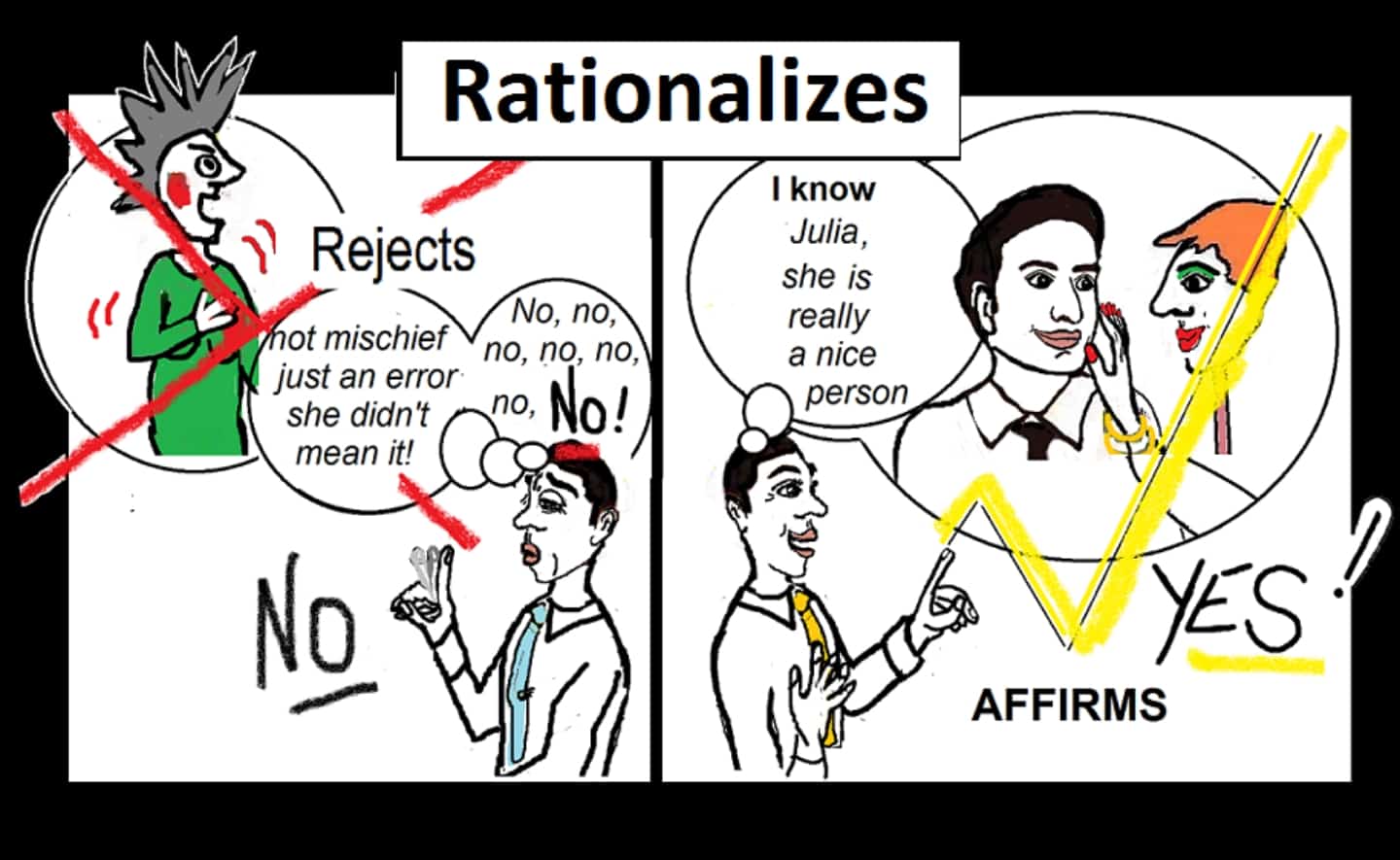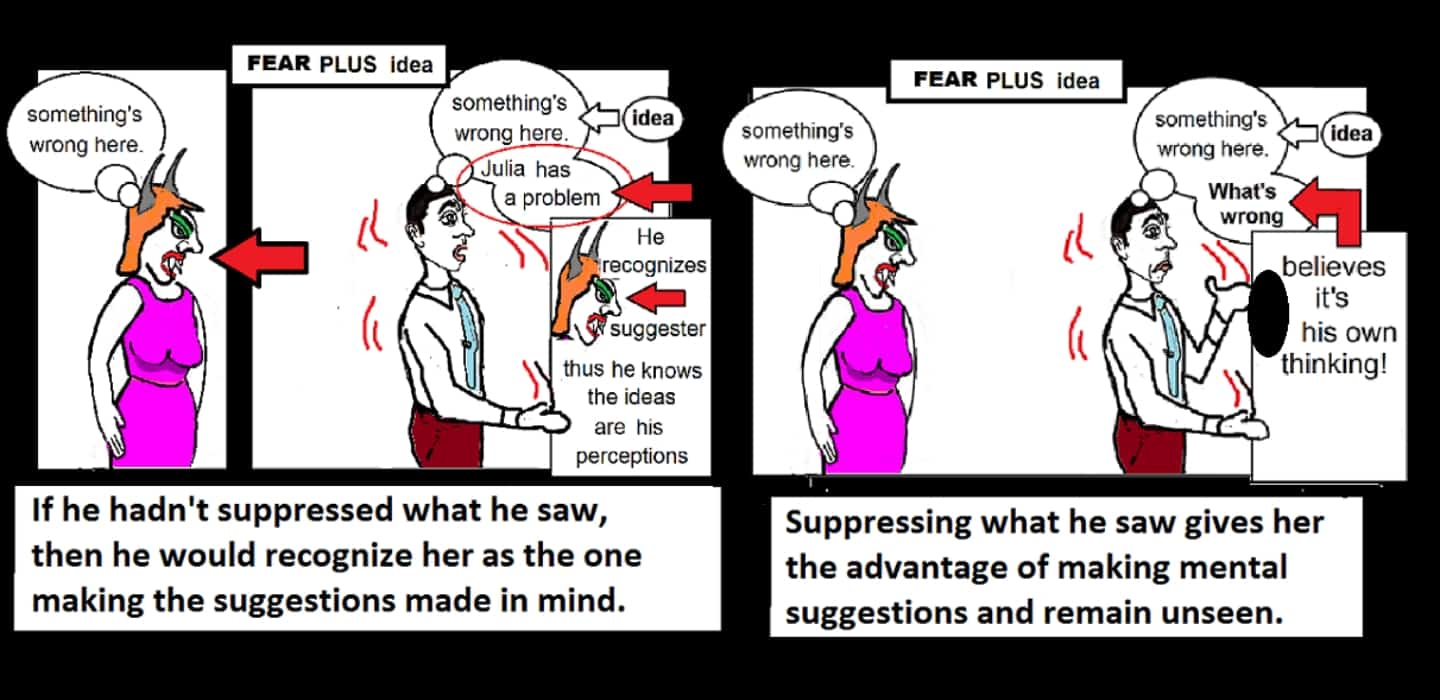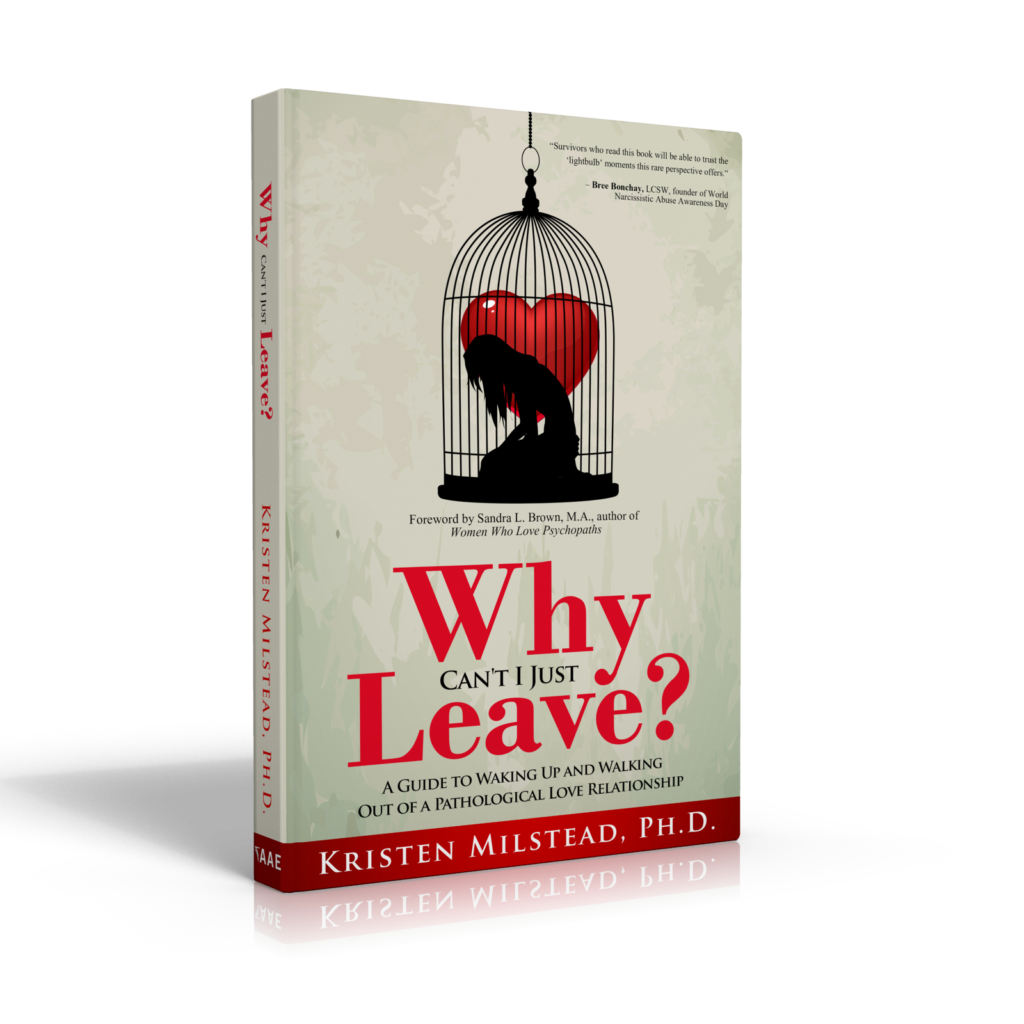Brainwashing sounds so dramatic. I really don’t have any other word to describe it– and yet it is the case that I was not in full control of myself. I take responsibility for my actions during that time because they were mine and no one else’s. I was acting with my own free will.
Yet I was not making decisions based on the decision-making skills that I normally use. I was unable to rationally take care of myself the way I normally would. Both somehow are true.
I was acting against my own best interests while dating a narcissist to put myself and my life in the hands of someone who repeatedly hurt me and was not taking my needs and safety into account. I was coaxed to a place where that seemed like a good idea, and then I was unable to see how it wasn’t once my safety was already compromised.
When someone acts against their own best interests, it’s not because they chose it willingly.
Let me say that again.
When someone acts against their own best interest, it’s not because they chose it willingly. They were _______ to hand over that choice. What word goes in the blank? Forced? Manipulated? Tricked? I mean he did tell me a couple of times that he played me. Should I take him at his word then? That was the point, right? He was proud of it, too. If you admit you “played” someone, you’ve pretty much given away the game. So let me explain now how that game is played.
When you are dating a narcissist (or married to one), you are stepping into their world and in all likelihood, you do not know it until it’s too late. Sometimes you do not realize it until the relationship is over and you process what happened. This is never a world that is built on equal terms with the best interests of both partners in mind. It is a relationship in which your own needs and ability to speak up for them are slowly and systematically eroded over time because they are in direct conflict with the needs of the narcissist.
This is a brief primer on what happens in a relationship with a narcissist and how that erosion takes place. This is how you “get played” and why you shouldn’t feel guilty or ashamed about how long it took to get out.
The Fairy Tale and The Horror Show
When you are dating a narcissist, there are two distinct time periods, or acts. I like to refer to them as “before” and “after.” Although both involve their share of brainwashing by the narcissist, they are very different from one another because of what comes in between the two. I will call them:
1. THE FAIRY TALE
2. THE HORROR SHOW
ACT 1 – THE FAIRY TALE: During this time, the narcissist tries to become the perfect partner through actions such as excessive flattery, mirroring your interests, and future-faking. He or she may try to fast-track the relationship and make grandiose statements about how they have never felt this way before. You fall deeply in love with the narcissist, and the narcissist is dependent upon your admiration and attention. He or she has manufactured this perfect world for the two of you to extract as much love as you have to give because this is truly life-sustaining for narcissists. This love-bombing is the first form of brainwashing. Narcissists may even feel love for you if you are particularly attentive, self-sacrificing and loving. That “love” is based on how you make them feel about themselves, however, and not because of who you are. You know nothing of this yet, that what the narcissist has presented to you is a facade and you have been manipulated into loving someone who doesn’t genuinely love you back.
The Transition and the Realization: Something happens from the narcissist’s point of view. The narcissist starts to perceive you differently when cracks begin to appear in his or her idealized view, or feels criticized by you over perceived slights and believes you have started to devalue him or her first. The relationship starts to change as the narcissist begins to devalue and mistreat you. Ultimately, it culminates in “an event” or series of events that are so egregious that you have an epiphany: Something is “not right” about this person. Something is off. Something is fundamentally wrong. I’ve should get out of this relationship.
ACT 2 – THE HORROR SHOW: During this time, the narcissist uses an additional and different set of brainwashing tactics to keep you bound to the relationship as long as possible after you learn something is wrong. This second set of manipulation tactics is layered onto the first. In this situation, the narcissist attempts to convince you through various means that the mistreatment you have suffered is not what you believe it to be. Without the existence of THE FAIRY TALE, THE HORROR SHOW could not exist, and yet the two are inextricably linked in a way you did not know until it was too late.
An Unfortunate Drowning
It was during THE FAIRY TALE that the narcissist gently eased you into the water. Now, in THE HORROR SHOW, you realize there is a danger you were not aware of. One of the most horrifying is realizing that your own gift of love was used to make you this vulnerable to what he is about to do.
He pushes your head under water, watching you struggle, then pulls you back up for two seconds so you can breathe. You gasp for air. Then he does it again. And again. And again. And…
“I don’t understand. Why are you doing this? I thought you loved me. Do you love me? Please stop.”
But every time he pulls you up for air, he gives you a different response.
- “I’m not drowning you. What are you talking about?”
- “I’m drowning you because I love you. And stop asking me if I love you. Of course, I do. Can’t you see how much?”
- “You deserve to drown. Remember that time you splashed water on me a year ago?”
- “I’m not going to talk about this. I’ll walk away and leave you here if you don’t stop.”
- “You look so pathetic right now. I can find somebody better. Someone who’s not flailing around in the water.”
- “I’ll stop drowning you, but you have to promise that you’ll stop talking about drowning forever. We don’t need to talk about it. You’re just going to have to trust me on this that I’m not going to do it anymore if you promise not to talk about it.”
- “I am drowning you, but so what? It won’t kill you.”
- “I didn’t mean to drown you. I just made a mistake.”
- “I’m just playing with you. Can’t you lighten up? This isn’t even considered drowning. You’re being too sensitive.”
In THE HORROR SHOW, part of the horror is that the answers you receive pose an existential threat to your sanity, as they signify every possible answer and no answer at all.
Why It’s So Hard To Save Ourselves
The transition is over. You’ve had the epiphany. You could save yourself… get out of the pool and run away… so what’s stopping you?
A. YOU’RE BEING DROWNED AND YOU’RE JUST TRYING TO SURVIVE: You can’t get out of the pool for the same reason you know something is wrong in the first place. It’s not your movie anymore and you don’t have a script. You don’t have all your strength, and you don’t know how to fight back yet because you don’t know what you’re dealing with.
B. YOU’RE IN SHOCK BY THE STARK CONTRAST TO EARLIER BEHAVIOR: You don’t know what you’re dealing with because the person drowning you was supposed to love you and you don’t understand why they’re drowning you. It’s a huge shock, especially since you’re not feeling very strong at the moment.

C. YOU’RE CONFUSED ABOUT WHAT’S HAPPENING TO YOU NOW: When you try to reconcile the two, nothing you get back makes sense. You don’t know what to believe and feel frozen trying to figure out whether this is your fault, whether it’s a mistake and the narcissist is going to stop, or whether it’s even happening and you’re just exaggerating. There is no narrative that actually aligns with what’s happening and you can’t figure out why.

You have been impaired in your ability to figure it all out, and the person you’re relying on to help you is the one who impaired you and is still feeding you bad information.
Then the longer it goes on, the weaker you get.
The weaker you get, the harder it is to just get out, and yet the harder it is to believe that the narcissist actually loves you.
And yet the more you believe the narcissist didn’t love you, the more confusing the situation becomes because you can’t understand why any of it happened in the first place and what all of it meant.
What may seem obvious to an outsider about dating a narcissist looks confusing to the person being abused. To outsiders, there are no questions to answer. There is no confusion. There is no suffering. There is no psychological manipulation. It may appear as if the victim is just allowing it all to happen, when internally, the victim may actually be fighting for his or her life through a mental fog purposely generated by the abuser. The abuser is doing his or her best to ensure the victim never resolves anything and puts it together that he or she is being abused.
I have previously written that there are actually two epiphanies with several stages in between. The first one, as described above, occurs when you realize something is wrong. The second one occurs later after more time has passed and you realize that if you don’t get out immediately something very bad will happen.
In between the two is a battle, with information-seeking and strength-gathering on your part and a continued erosion of your will to leave on the part of the narcissist, both fighting for control of your mind. Until one of them wins.
So I ask these questions:
- If you’re in the water, how do you know you’re drowning if you’re barely conscious enough to figure it out and the person drowning you keeps you perpetually and purposely confused about the conditions?
- Once you do have the second epiphany and realize that you’re going to die if you don’t get out, how do you save yourself if the person drowning you is in your way and holding you down?
These are not hypothetical questions that are impossible to answer. They are real questions designed to highlight the psychological strength of people who leave their narcissistic abusers. People can and do leave and they go no-contact, but what they overcome in order to do that is monumental. This triumph should never be minimized
Remember: narcissists never truly discard you so even if they went silent but then you cut them off, changed your focus, and started the process of taking care of you, you’re a warrior and don’t ever forget that.
And if you’re still working on it, you can get there and you will. Find your support system, figure out where you are in the process of leaving, and build your strength to prepare for the end. Understanding what narcissists are trying to do to you and thinking through what the end looks like are some of the best weapons you can have. Those are the kinds of things that will help you to move out of the narcissist’s false reality and back into your own where you will be safe again.






5 Comments
Ella
Or as you’re coming up for air it’s something like – Oh my God I was drowning you five minutes ago! Why do you insist on constantly bringing it up? You’re obsessed! You need to learn how to move forward if we’re going to commit to this relationship, not get stuck in bitterness & drag everyone around you down with you! I’m committed to making this work why aren’t you? You’re making me sound like a terrible person! You’re bullying me! Now as punishment I’m going to drown you even harder while telling you how much I love you like I’ve never loved before or even knew was possible and would give everything I am and have to stop you from drowning even if I have to drown instead! Bitch! Ah good times, good times 🙂
Kat
This is excellent! How you capture how these entanglements occur and pan out. It was the most mind-bending experience I’ve ever experienced. It was painful. Even while I was in it- after the second realization that you mention… There were so many times my heart just sank. So many times the futility of it was just overwhelming. So many times I was left speechless. I learned a lot. I am 2 1/2 years out of the entanglement. It took me over a year to stop obsessing over it and feeling awful and imagining they were on to this fabulous life with someone else. And it took me another year to totally feel free. To reclaim my inner health and outer health. To feel happy alone and in my own skin. To have an exhilarating hope for the future that includes nobody but me. I have actually spoken with my ex several times in the last two years. I have seen them with the new person very recently. And I finally came To a point where I feel compassion for the new person because I can sense and see that nothing has changed… And they’re going to experience much of what I did if not more. I don’t feel the need to obsess over it anymore. I know how to play the game when I speak with my ex. I don’t bring up anything that would make them appear in a bad light. I don’t bring up the past I don’t ask about the new person I don’t discuss my feelings about what happened because that narrative is 100% rewritten by the narcissist. I play the game. It’s kind of fascinating now that I’ve studied NPDFor so long. I was studying it before I was discarded. In fact I was studying it within the first year… Because the behavior fit. Anyways I have a very analytical mind and that may have been part of why I stayed too long. I do know I was addicted. And maybe I found it fascinating and it became like a game in my head or something… But I’m glad to be out of it. My mind is much clearer my relationships with other people are much better I hardly drink alcohol anymore my anxiety is really low. I hope this excellent article makes it in front of the eyes of the people that need to see it and that it helps them. Thank you!
Because like you note -it is a dangerous addiction and hard to get out of if you go down the road. Thank you so much for this excellent essay and I hope people that need to see it see it and it wakes them up and gives them strength!
Amazing how you captured how this all occurs – it was one of the most emotionally Painful and complicated mind-bending experiences I’ve ever been through. And in some ways that may have been why I stayed engaged longer than I should have. And it definitely still amazes me and I’m out for 2 1/2 years now. I am at peace with everything and I have actually spoken with my ex several times and I have genuine compassion which I don’t state Because they would be like why do I need compassion? Unless it is compassion for other things in their life then I definitely show that. Because I know my role is to solely feed their needs. I play the game. I feel empowered. I expect nothing from them. And I find it fascinating how everything they do is predictable now that I have studied narcissistic personalityDisorder in depth. I have no fear that I will ever be entangled with one again because I feel I have shored up my own self and will never accept such behavior again And believe that I will be able to handle it or change it.
Because like you note it is a dangerous addiction and hard to get out of if you go down the road. Thank you so much for this excellent essay and I hope people that need to see it see it and it wakes them up and gives them strength!
Katalyna
Wow. This is a really great summation of what it is like. It really makes me sad and a bit angry that they’re able to do this to unsuspecting people. Causes so much damage and most people just have no idea what it’s like to get ensnared.
Kristen Milstead
Thank you. Yes, it makes me angry as well!